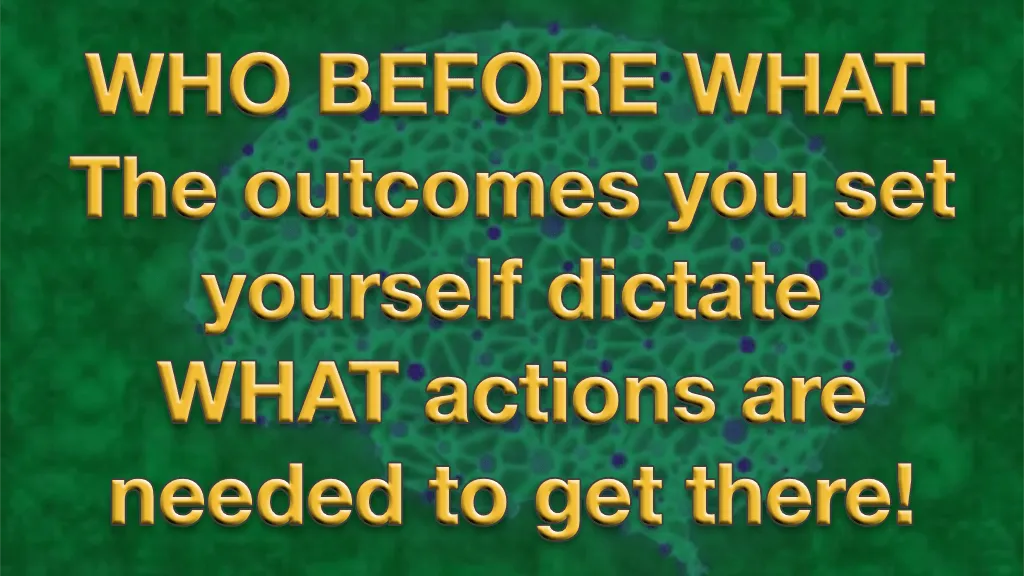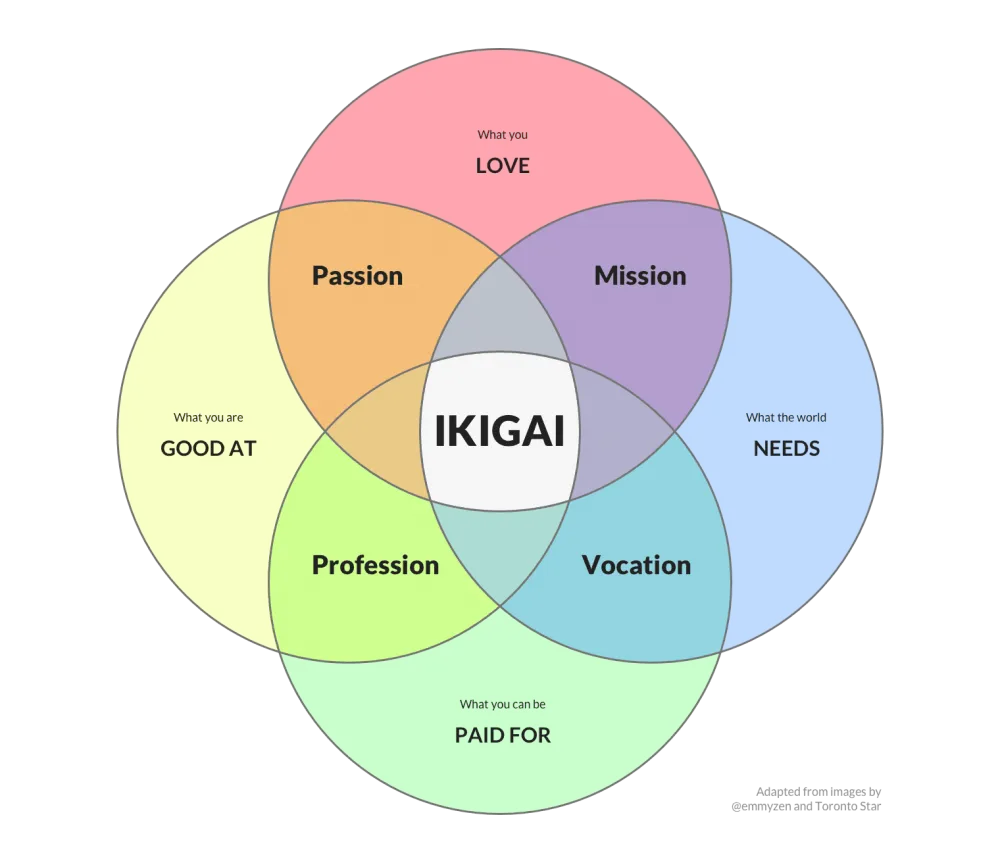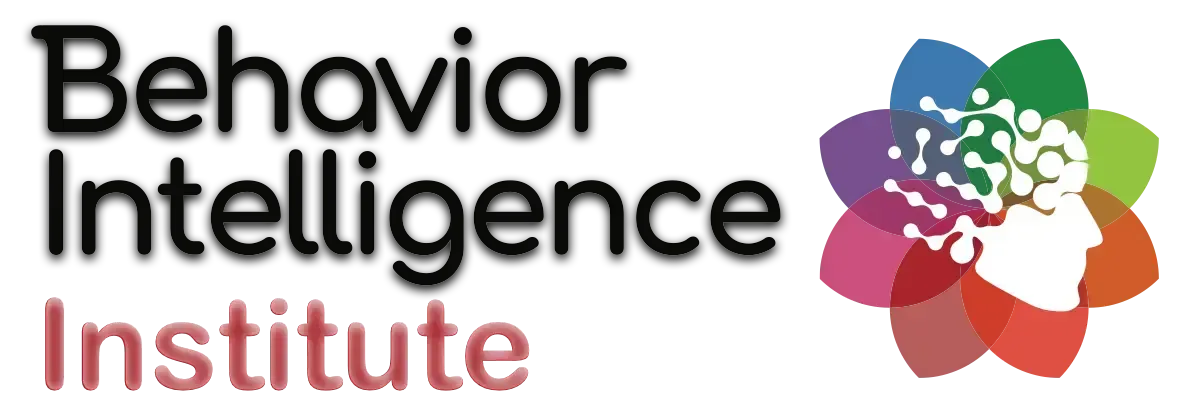Blog
Categories

Who Do You Need To Be In Order To Have Success This Year?
Why people do the things they do.
In one of my previous blogs "Failed New Year Resolutions," I introduced a concept Stop the WHAT and focus on the WHO. While this spoke at a fairly a high level, I thought it warranted further details, examples and even some exercises you can do for yourself.
Let me start by introducing you to an old Japanese model called "IKIGAI" pronounced in English [ee-kee-guy].
This concept introduced as far back as the 800'th century had played an important role back then, and maybe even more important today for many reasons. The fast paced lives of the big cities, technological advancements, and the pressures that come from the wealth of information available via the internet today.
We can be easily consumed by these and be totally immersed without realizing it's happening. All of which can ultimately lead to the plethora of health issues that we observe increasingly all around the world.
While there's been a lot of talk over the past decade or more about "Life-Balance" this model is somewhat different.
Life-Balance has often resulted in an imbalance.
Some people take Life-Balance to mean more personal time, or more family time rather than work time. A very time focused need for balance.
While others have referenced the same to mean Quality not Quantity. The quality of work experience and the quality of personal experience.
Who's right?
Is it important to have a right and a wrong?
Probably not.
It's not possible to dictate to others how they should or shouldn't feel about life balance, or what meaning they give to it. The meaning each one gives to Life-Balance is very subjective to those that look at things subjectively or emotionally, and it is very objective to those that are more logical and objective in their thinking patterns or style. (But that's a topic for another day as it is more to do with how we are programmed to think, and our ability to be intelligent about the behaviors of others, not just our own.)
Back to our topic: WHO before WHAT.
When setting goals first you need to know WHO you are today, and WHO you might need to become. After all, the WHAT activities you set yourself as part of your goals, need to be aligned with your values and beliefs. They need to be ecologically balanced with your values and beliefs, as well as be ecologically appropriate to the world around you. Otherwise either your brain will reject your efforts to achieve these goals, or society will reject you. Just like some of what we do to the planet causes imbalances in other parts of the world.
It's a Yin and Yang effect.
When goals are aligned with WHO you are and WHO you believe yourself to be able to become, then goals are easy.
Keep in mind that these are never fixed. Each step you take towards your goals, will likely open up new opportunities you were not aware of.
Will these distract you from WHO you want to become, or will they further enhance it and contribute to your evolution into that person.
You are either Evolving or your are Dying - I am not sure if this a quote by anyone in particular, so if it's not I I'll claim it - lol.
I've heard this quote quite a bit over the last few years "What do you want your tombstone to say about you and the life you led, and what you leave behind as a legacy?"
Often a far stretch for young people to think about their tombstone, while for the older generations it results in a panic to do something meaningful because time is running out.

And again, if you noticed, the word WHAT shows up.
Better to have said "How do you want to be remembered? When people remember you, WHOM will they recall? WHO will they say you were?"
What makes IKIGAI relevant and important to our topic today? It is an amazing tool not just a philosophical model.
You can use this to identify with who you are today and expose the gaps into whom you would like to be at the end of your journey on this earth. Religions aside.
Let's do an exercise together. Take a copy of the diagram above, or create your own, whatever works for you.
Use pen and paper or use technology. It doesn't matter.
Before you start;
Find a quiet space where you can spend a good hour in this first go around to work through this exercise. If that's not possible right this instance, then continue reading so you know what we are going to do, and make time to do this later.
Next, we need to set a context for this exercise otherwise people get confused.
So we'll focus on WORK as the context.
Let's start at the top:
At work last year, when people think of the quality of your work, skills, and abilities, which of these would they say that you do well.
You might want to list main tasks you preform, and give this to a few people you work with and ask them to rate you out of 3 - where 1 is not good, 2 is average, and 3 above average. NOTE: People get hung up on giving perfect scores, which is why the top score doesn't use words like Great or Perfect - the work just needs to be recognized as above average, or better than average.
Leave your own subjectivity out of it, right now, we'll get to that in the next point. For now we need to be objective. Other people's perceptions are really important. They provide a reality check.
Be sure to make it so that these score are;
Anonymous
You DO NOT LOOK AT THESE till Step 3 below.
Looking back at the things you did last year at work, what did you enjoy the most? What do you still love to do?
Maybe it's being creative, or helping people. Perhaps it's making money.
Don't be skewed by the scores you received in the first exercise.
In fact don't look at those scores, but use the same list to give yourself a subjective score in a similar way. Where 1 is least favourite, 2 is just ok, and 3 is Love it.
Now let's put these on a sheet (a spreadsheet is a good idea if you are a bit of techie). On the left hand side, in a single column, list all of these tasks that you have performed. Then create a couple of columns to the right of these, and transfer your scores and the scores given in Step 1 to these two columns;
In the first column: Total up all the scores from all the people who responded to your feedback survey.
In the 2nd column place your score to the right of that.
Now multiply the two numbers so that the end result more significantly separates the gap between these.
One more thing: There is going to be some things where people didn't score you, either because they were not aware of that activity for you, or it just wasn't something they observed or could score you on. Give all these people a 2 on their score card.
Now that you have these scores you can see which ones really stand out, but there is potentially a mismatch between what you Love - subjective you, and what people believe you to be good at.
If you really love something but you are not yet good at it, then this represent a gap which you can work on. Maybe you need some training or education in this area. Maybe you just haven't had enough opportunity to build your experience, or for others to observe you doing that.
Take a highlighter pen and highlight these. We'll come back to these later.
Does the world need that, which is different from will they pay for it. This can be a little contentious. For instances: The world needs more volunteers to help in 3rd world countries, and it doesn't have any monetary compensation. So let's keep the focus on the context of WORK.
Here is where you can roll up your sleeves and ask Google to help you with some market research. There are many sites that provide statistics on growing or declining markets. This would be a good place to start.
NOTE: New markets can show fast growth because 100% of $0 is a pretty significant growth percentage compared to 5% of $millions. Be careful with these, because (as I explain in another blog) there is such a thing as Bleeding-edge. Early adopters pay the price.
Take some of the scores, or score these yourself. Use the same scoring system - 1, 2, and 3. Then again multiply these scores by the previous column. The scores should really start to separate out some key tasks, or roles you perform. Tasks you love and perform well might lose lustre if there is no need for them, or might stand out if they are aligned with world needs.
Now IKIGAI focuses on human traits, which I would identify as NEED. Humans like to be needed, and we all have survival needs. Based on your own economics, each person has a unique measure of this. IKIGAI refers to this as "Will people pay for that?".
Step 3 above will have already started to apply a monetary weight to the areas of desire and skills.
IKIGAI suggests that "Your reason for being" which satisfies you and gives you peace of mind needs to be aligned with what the world needs and will pay for. But there are roles that are very satisfying and which do not pay well if at all, and yet provide the same if not a greater satisfaction.
This concludes the first part of the process to answer the question in the context of WORK:
WHO ARE YOU? WHOM DO YOU WANT TO BE KNOWN AS/FOR?
Take your time to complete this, so you can look at this anytime over the coming years and adjust it to improve your clarity. When you have done this, the WHAT stuff that you need to do will easily come to you, and will feel right.
You will no doubt have gaps from WHO you are today and WHO you want to be in the future. That's the whole point. No one should start with WHAT if they have clarity on WHO/WHOM they wish to be.
BTW, we're not quite done yet. Would you have more clarity if you repeated this exercise while changing the context of WORK to HOME? Yes. Of course you would.
WHO YOU ARE IS MORE THAN JUST - AT WORK.
Take your time to complete this again but this time you are going to ask your family and friends.
If you get stuck and need help, feel free to reach out to me and schedule a quick call by clicking here.
Hope you found this useful.
As usual, feel free to share this with your friends and families. Be a true friend and pass it forward.
Copyright 2021 AccuMatch Behavior Intelligence is a division of NLP Profiles Inc. | Privacy Policy



